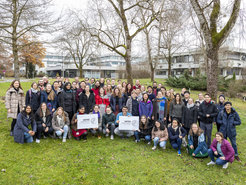An expanding life science hub for the scientists of the future
Two new international programs for doctoral students start at the Max Planck Institutes in Martinsried and Seewiesen
International Max Planck Research Schools (IMPRS) are elite graduate programs that offer structured training of doctoral students at Max Planck Institutes and their local university partners. Now, two new IMPRS programs with a focus on the life sciences are launched in the Southwest of Munich: The "International Max Planck Research School – Biological Intelligence" (IMPRS-BI) and the "International Max Planck Research School for Molecules of Life" (IMPRS-ML). Young scientists accepted into either of these programs will have an opportunity to participate in, and contribute to, groundbreaking research carried out by the Max Planck Institutes (MPIs) of Biochemistry and for Biological Intelligence, while pursuing their doctoral degrees.

IMPRS-ML research will focus on the structure, function, and dynamics of biomolecules. In doing so, doctoral students will use state-of-the-art technologies and develop new methods to investigate how and where these molecules interact in biological systems to respond to environmental stimuli. The program brings together scientists from the fields of structural biology, biochemistry, biophysics, cell biology and systems biology to understand the molecular interactions and causal basis for fundamental biological processes. Ultimately, the research of IMPRS-ML students will illuminate production, breakdown, interactions and signaling between cellular components, viral infections and immune responses, neurodegeneration, totipotency and other biological processes at unprecedented resolution.
The MPI for Biological Intelligence and its corresponding IMPRS are located at two sites: in Martinsried, next door to their colleagues at the MPI of Biochemistry, and in Seewiesen near Starnberg. Research in biological intelligence explores how animals acquire, store, apply and transfer knowledge about their environment. The new approach integrates neuroscience, behavioral ecology and evolutionary biology and bridges all scales of biological organization, from molecules to organisms and from organisms to societies and ecosystems. The research of IMPRS-BI students will be shedding light on the evolution, development and diversity of animal behavior and will, among many other questions, unravel what distinguishes natural from artificial intelligence.
Through a wide range of courses, events and qualification opportunities, the new joint training campus will serve as a hub for the education of around 300 doctoral students in the southwest of Munich, with potential for further growth. In addition to the two MPIs, research groups at the two Munich universities, LMU and TUM, participate in IMPRS-BI and IMPRS-ML. Shared activities among these institutions will create a diverse training environment and excellent networking opportunities for young researchers.
With generous support from the Bavarian government, a state-of-the art Max Planck Campus in Martinsried is to be built in the coming decade. This will further strengthen Martinsried as a life science and biotechnology powerhouse. The two new IMPRS programs will serve as cornerstones of this ambitious endeavor.
